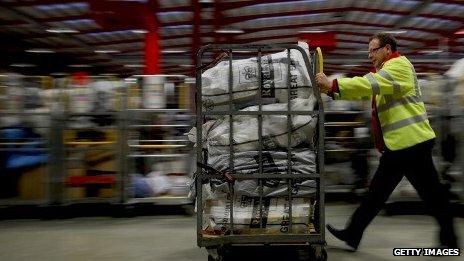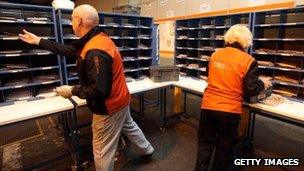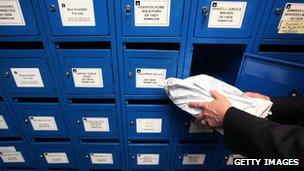Royal Mail strike: What will the impact be?
- Published

A nationwide strike of Royal Mail workers is to go ahead, says the Communication Workers Union, after its members voted four-to-one in favour of industrial action.
The last time national strikes by postal workers were seen in the UK was in 2009, when a series of walkouts led to widespread disruption.
It was estimated that in the first wave of nationwide strikes in 2009, there was a backlog of 30-60 million, external pieces of post.
In the second wave, the backlog was of more than 50 million.
It was also reported that some businesses suffered heavy losses, orders were unfulfilled, staff were unpaid, and some were even laid off.
So what will the impact be now, in 2013?
The context of the postal service has changed. In the past four years competition has boomed, and while any disruption to the six-day-a-week universal service will be unwelcome to many, this time a lot of businesses have already made other plans.
Federation of Small Businesses national chairman John Allan is urging his members to start preparing now to avoid a hit on their revenues.
"We would encourage businesses to look at contingency plans," he says.
"Ultimately, those firms reliant on using the postal service to deliver goods will be put at a disadvantage, with consequential negative impact on their bottom lines."
More options
A glance at the websites of online retail giants such as Asos will reveal statements reassuring customers that in the event of a strike, parcels will be directed to other service providers.
Amazon, the Royal Mail's biggest single business customer, said in a statement on Wednesday: "If one of our carriers was unable to provide delivery services at any time, we would employ contingency plans which include routing orders through our other carriers."

In 2009 during the last round of strikes, rivals to Royal Mail such as TNT gained customers
These other carriers have boomed in the past few years - from UK Mail to TNT, DX Exchange, and the likes of Hermes and Yodel.
Some of Royal Mail's competitors were even established, says former postal regulator executive Stephen Gibson, of SLG Economics, because of previous industrial action.
"The difference really between the strikes of the recent past and now is that there is more competition now," he says.
"Previous strikes became a market opportunity for companies, and after winning that business, they've kept it."
Plans in place
David Stubbs, a postal economist, agrees that a lot has changed in the world of deliveries since 2009.
He says that competitors have proved themselves reliable, especially for businesses who were reliant on the Royal Mail, such as many eBay companies.
However, he says, for smaller companies, strikes could cause real problems, especially given the timing.
"If there were to be more strikes, leading up to Christmas, there would be real issues," he says.
"Royal Mail processes almost double the volume in December over a normal month.
"For the big retailers, they will have already got other plans in place, and they will have contracts with competitor companies. However, it will be disruptive. Those competitors are already straining with deliveries."

DX Exchange opened in Birmingham in 2010 to compete with the Post Office
He adds that some services, such as TNT, may look to expand their network.
"There is a potential that alternative postal companies may expand their end-to-end delivery networks - TNT might try and deliver more to the home," he says.
"But there is some uncertainty around what Ofcom [which regulates the sector] would do in that situation - the regulator has threatened to impose universal service conditions on competing mail providers."
'Everything creaks'
Andrew Starkey, the head of e-logistics at IMRG, the body that represents the UK's online retailers says that more choice in service has also been matched by a surge in the volume of parcels delivered, so taking on more business contracts will be a problem.
"Royal Mail has been the default carrier of choice along with the post office network while the online shopping sector has developed, and though more competition has come into the market, there is also a lot more volume," he says.
He says that by the end of 2013 there will be an estimated 1.24 billion online orders generated by UK retailers and eBay traders.
"There are tens of millions more orders this year than last from online retails and Royal Mail carries about 50% of them," he says. That figure rises to 90% for returns, Mr Starkey adds.
"If Royal Mail goes down everything creaks."
Yet Mr Starkey says that the alternative network can cope with a one-day strike.
"If it's more frequent, or a week-long stoppage, then that's a problem," he says.
However, he and postal economist David Stubbs agree that the increasing popularity of "click and collect", whereby online orders are collected by the customer at a local shop, will ease congestion for parcel deliveries.
Mr Starkey adds: "This came into its own in the very bad snow of 2010. It caught on from that point, and for small retailers who don't have this in their own stores, their networks have grown.
"There are about 12,000 outlets now. That's about the same number as there are Post Offices anyway."
- Published16 October 2013
- Published15 October 2013